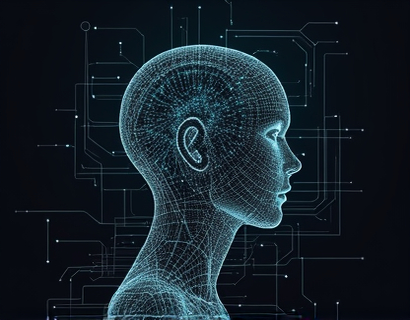Personalized AI Companions: Enhancing Children's Creativity and Emotional Well-Being Through Interactive Digital Friends
In the rapidly evolving digital age, the integration of artificial intelligence into children's playtime has opened new avenues for enhancing creativity and emotional well-being. Personalized AI companions, often referred to as imaginary friends, are revolutionizing the way children interact with technology. These AI-driven entities are not just simple games or apps; they are sophisticated tools designed to provide a safe, imaginative, and personalized space for children to grow and develop. This article delves into the benefits and mechanisms of these AI companions, exploring how they can transform playtime into a powerful tool for social skill development and emotional health.
The Concept of AI Imaginary Friends
AI imaginary friends are digital entities that use advanced algorithms to understand and respond to a child's inputs in a way that feels natural and engaging. These companions are programmed to adapt to the individual child's personality, interests, and emotional state, creating a unique and personalized experience. Unlike traditional toys or video games, AI imaginary friends can learn from interactions, evolving over time to better suit the child's needs. This adaptability ensures that the companions remain relevant and engaging, fostering a deeper connection with the child.
Personalization and Creativity
One of the most significant advantages of AI imaginary friends is their ability to personalize the experience. Each companion is tailored to the child's specific interests and preferences, whether it's a love for adventure, a fascination with animals, or a passion for art. This personalization encourages children to explore their creativity in ways that are meaningful to them. For instance, a child interested in storytelling might engage in elaborate narratives with the AI companion, crafting complex plots and characters. This process not only stimulates creative thinking but also enhances narrative skills and imagination.
Moreover, the interactive nature of these companions allows children to experiment with different scenarios and outcomes. They can create worlds, solve problems, and overcome challenges within the digital environment. This kind of creative play is crucial for cognitive development, as it helps children develop critical thinking, problem-solving skills, and a sense of agency. The AI companion serves as a catalyst, guiding the child through the creative process and providing feedback that encourages further exploration.
Emotional Well-Being and Social Skills
Beyond creativity, AI imaginary friends play a vital role in supporting children's emotional well-being and social skill development. These companions are designed to understand and respond to a child's emotions, offering comfort, encouragement, and guidance when needed. For example, if a child is feeling sad or anxious, the AI companion can engage in conversations that help the child process these feelings. By providing a safe and non-judgmental space, these companions help children develop emotional resilience and coping strategies.
Social skill development is another critical area where AI imaginary friends excel. Through interactions with the digital companion, children can practice communication, empathy, and cooperation. The AI companion can simulate various social scenarios, allowing children to navigate different social situations and understand the perspectives of others. This is particularly beneficial for children who may struggle with social interactions in real-life settings, as it provides a low-stress environment to build confidence and competence.
Safe and Imaginative Playspace
The digital environment created by AI imaginary friends is carefully designed to be a safe space for children. Unlike the internet, which can expose kids to inappropriate content or online predators, these companions operate within a controlled and monitored framework. Parents and guardians can rest assured that their children are engaging in positive and constructive activities without the risks associated with unsupervised internet use.
The imaginative aspect of these companions is equally important. The AI companion can generate endless scenarios and activities, from exploring fantastical lands to solving mysteries. This endless supply of imaginative content keeps the playtime engaging and fresh, preventing boredom and encouraging continuous interaction. The combination of safety and imagination ensures that children remain motivated and enthusiastic about their digital playtime.
Supporting Parent-Child Interaction
AI imaginary friends do not replace traditional play or parental involvement; rather, they complement and enhance it. Parents and guardians can participate in the child's play, using the AI companion as a tool to bond and connect. For instance, a parent might join in a storytelling session, contributing ideas and expanding the narrative. This shared experience not only strengthens the parent-child relationship but also models healthy interaction and collaboration.
Moreover, the insights provided by the AI companion can be valuable for parents. The companion can offer feedback on the child's emotional state, creative thinking, and social skills, providing parents with a better understanding of their child's development. This information can help parents tailor their support and engagement strategies, ensuring that they are addressing the child's specific needs effectively.
Educational Benefits
The educational benefits of AI imaginary friends extend beyond creativity and emotional well-being. These companions can integrate educational content seamlessly into play, making learning fun and engaging. For example, a child interested in science might engage in experiments and discoveries with the AI companion, learning about concepts like gravity, plants, and animals in an interactive and enjoyable way. This approach to learning can help build a strong foundation in various subjects, fostering a love for education from a young age.
Additionally, the AI companion can adapt to the child's learning pace and style, providing personalized educational experiences. This adaptability ensures that each child receives the support they need to thrive, whether they are advanced learners or require extra assistance. The companion can also track progress and provide feedback, helping children identify areas for improvement and celebrate their achievements.
Challenges and Considerations
While the benefits of AI imaginary friends are numerous, it is essential to consider potential challenges and ensure responsible use. One key consideration is the balance between digital and physical play. Over-reliance on digital companions can limit opportunities for outdoor activity and social interaction with peers. Parents should encourage a balanced approach, combining digital play with traditional activities to promote overall development.
Another important aspect is the quality of the AI companion. Not all AI imaginary friends are created equal, and the effectiveness of these companions depends on their design and implementation. It is crucial to choose reputable and well-researched platforms that prioritize the child's well-being and development. Parents should also monitor the interactions to ensure they remain positive and beneficial.
Future Prospects
The future of AI imaginary friends is promising, with ongoing advancements in AI technology likely to enhance their capabilities further. As these companions become more sophisticated, they will be able to provide even more personalized and nuanced interactions, deepening the connection with children. The integration of augmented reality (AR) and virtual reality (VR) could also open new dimensions for imaginative play, creating immersive experiences that blur the lines between the digital and physical worlds.
Moreover, the potential for AI imaginary friends to support children with special needs is significant. These companions can be tailored to meet the specific requirements of children with autism, ADHD, or other conditions, providing tailored support and therapy in a comfortable and familiar environment. This inclusive approach can help ensure that all children have access to the benefits of AI-driven companionship.
Conclusion
Personalized AI companions represent a groundbreaking advancement in children's play and development. By combining creativity, emotional support, and educational value, these digital friends offer a unique and beneficial experience for young minds. As technology continues to evolve, the potential for AI imaginary friends to enhance children's lives is vast, making them an exciting and valuable tool for parents and educators alike. Embracing this innovation can help children grow into confident, creative, and emotionally resilient individuals, ready to face the challenges of the future.











































